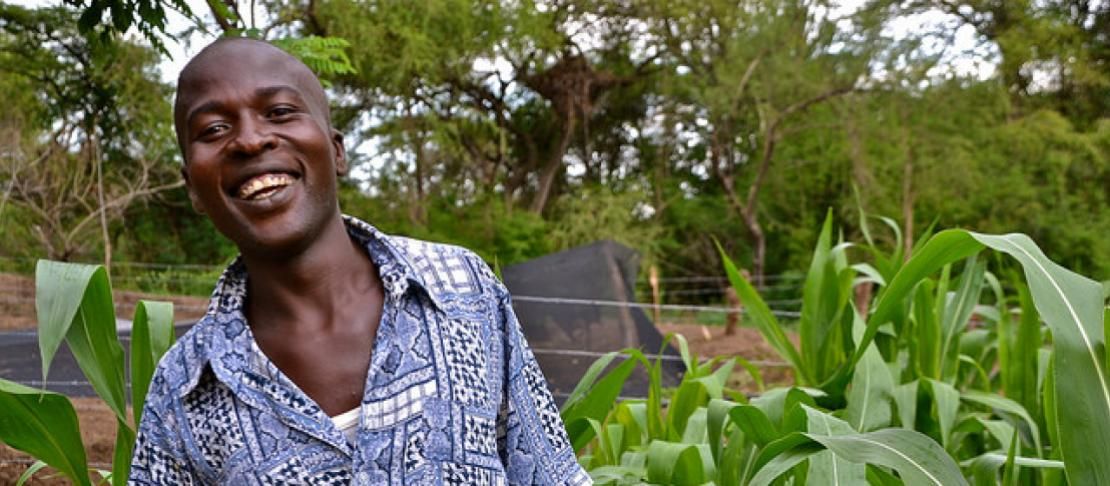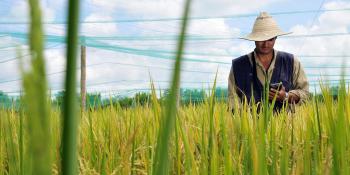Is agribusiness the magic bullet for youth unemployment in Africa?

Africa is facing a double employment crisis—a lack of jobs for youth, and an increasing number of young people in need of work. While agriculture is the largest sector of employment in Africa with promising job opportunities for youth, the sector is often regarded as unattractive for and by young people.
Africa has the largest population of young people in the world, with 226 million people aged between 15 to 24 years. Every year, young graduates from schools and colleges seek to enter the continent’s workforce, often with no success. What role can the agriculture play in addressing the unemployment challenge in Africa? According to a World Bank report on “Growing Africa: Unlocking the Potential of Agribusiness”, Africa’s farmers and agribusinesses could create a trillion-dollar food market by 2030 if they can expand their access to more capital, electricity, better technology and irrigated land to grow high-value nutritious foods. National governments, however, need to work side-by-side with agribusinesses, to link farmers with consumers in an increasingly urbanized Africa.
To stimulate discussions on developing a framework for concrete youth engagement in agribusiness in a changing climate, the CGIAR Research Program on Climate Change, Agriculture and Food Security, the CGIAR Research Program on Livestock, the Climate Smart Agriculture Youth Network (CSAYN), AgriProFocus and ICCO Cooperation put together an online discussion and a webinar. The online discussion —which attracted 79 comments —ran for one month to commemorate World Youth Skills Day (15 July) and International Youth Day (12 August) and culminated in a webinar attended by 80 participants (30 August). A key message from the online discussion and the webinar is the need to address the negative perception towards agriculture.
I gladly applied to study agricultural economics in the university but was surprised that 90% of my classmates then, did not have interest in the course. In fact, most of them left the course before our graduation while few struggled to finish. Based on the question asked, agriculture is not a preferred career or choice course for young people because of wrong mindset and poor orientation of youth and parents about agriculture. Sincerely, my parents did not want me to study agriculture because there are uncountable number of farmers that died poor and they don’t want me to be among the number."
Fakunle, online discussion.
Watch the webinar recording:
Youth engagement in climate-smart agriculture
Divine Ntiokam from CSAYN set the scene for the discussion by sharing CSAYN's work on youth engagement in Africa. The group, run on a voluntary basis, promotes and strengthens climate-smart agriculture among youth. More specifically, CSAYN aims to raise awareness of the contributions youth can make in agriculture for a better future, especially through the application of climate-smart practices.
CSAYN does outstanding work in this area. In Rwanda, for example, CSAYN partnered with SOS Children’s Village Rwanda in February 2017, to train over 50 young students on how to protect the environment, particularly sensitization on the impact of climate change on agricultural productivity. In Mali, CSAYN organized environmental academies such as climate justice ambassadors to raise awareness about climate change and created CSAYN Mali club, and planted 25 trees with children in two schools.
Agriculture offers many opportunities along the value chain. Victor Esendi from AgriProFocus emphasized that we need to think of new ways to create new opportunities or expand existing ones for youth employment in agriculture.
“We see climate-smart agriculture as an opportunity for African youth to innovate and ensure continuous supply.” While climate change affects food production, young people can think of new technologies to produce or preserve food, and ensure supply to the market.
The opportunities are there, but how can we actually engage youth?
Wouter Kleijn from the International Livestock Research Institute (ILRI) addressed how policies and programmes can facilitate youth involvement in agribusinesses focusing on three questions:
Should we engage more youth? There are legitimate arguments expressed against focusing on youth involvement; for example, that by increasing production on big farms can address food security without demand for more labor, or that population growth will offset all the youth moving away from rural areas. But even if young people will stay in rural areas, it does not mean they will be involved in agriculture, Mr. Kleijn said and added that “there is an issue of too many youths with too few jobs in urban areas and this eventually will lead, if we are not careful, to violence”.
What is different between youth today from youth from previous generations? Climate change makes agriculture more knowledge-intensive and more difficult, and even less attractive for youth. There is also less land available because of population growth and increased life expectancy. Youth are also more aware of alternatives; “they see on their mobile phones, they see it on the television that there are other lives out there, other possibilities”.
Knowing all of this, how can we involve youth? There is no blueprint solution but there are a few things to explore. For example, addressing the ’usual suspects’ such as infrastructure, corruption, education supporting existing youth entrepreneurs and encouraging them to scale up so they might employ other youth.
There is need for practical examples and more youth engagement. Catherine Mungai from CCAFS East Africa shared why it is important to engage with the youth in terms of research and policy-making. She gave example of CCAFS East Africa’s work with the youth in the Nyando Climate-Smart Villages (CSVs), where youth are testing a couple of CSA practices and technologies. “There are a lot of opportunities to involve youth, such as in agroforestry, irrigation, fish farming, and in developing apps for climate information services, we need to find a way to present agriculture as an interesting opportunity for youth.”
Way forward
During wrap up session of the webinar led by Alpha Gitau from ICCO Cooperation, participants emphasized that change does not happen overnight; we need to focus on youth who are already interested in agriculture. We need to start small and grow youth-led agribusinesses slowly, helping them get access to resources and encouraging them to innovate. We also need to support already-existing networks such as CSAYN and YPARD who are already addressing young people so that they can speak with one voice for those who support youth engagement in agribusiness, including CCAFS.
Read more
- Visit the online discussion forum on engaging African youth in agribusiness in a changing climate
- Who calls the shots? Youth participation in agricultural decisions and national policy
- From food to money in the pocket: Engaging African youth in climate-smart agriculture
- Youth involvement in agribusiness: Examples from Africa
Lili Szilagyi is the Communications consultant for the CCAFS Program Management Unit and CCAFS East Africa.
Catherine Mungai is the Partnerships and policy specialist at CCAFS East Africa.




